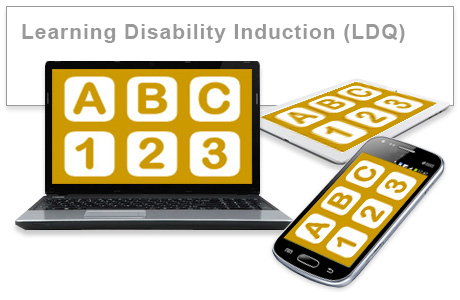learning-disability-induction-ldq-f
Learning Disability Induction (LDQ) (F): e-learning training course

This e-learning course entitled Learning Disability Induction (LDQ), is divided into six easy-to-follow units consisting of an introduction and five study units. The aim of the Disability Awareness course is to raise awareness of learning disabilities.
By gaining a better understanding of the subject, learners will be able to provide more effective support to the people in their care.
Unit 2 provides a useful background for anyone supporting people with learning disabilities. In the past, it was an enormous disadvantage to have a learning disability, but times have changed and there have been improvements in the way we provide support for vulnerable people. This unit explains in detail how we are now better able to understand and support them. After completing this unit learners will understand that the term 'learning disability' is a label which is convenient for certain purposes and that it is important to remember that individuals with learning disabilities are, first and foremost, people like everyone else.
Unit 3 introduces the principles that are fundamental to supporting people who have
learning disabilities including:
- person-centred values and practices
- person-centred support
- respect for diversity.
This unit also explores positive risk-taking and the importance of detailed support planning, as well as looking at issues of confidentiality.
Unit 4 explores the role and responsibilities of a learning disability worker. It introduces the concept of partnership working and the distinctive nature of a worker's relationship with those being supported. Learners study the principles of effective communication and record-keeping and learn about the importance of working in line with policies and procedures. On completion of this Disability Awareness course unit learners will understand that they have a responsibility to continue developing their own skills and knowledge.
Unit 5 introduces the knowledge that learning disability workers need in order to carry out their work safely. It considers general health and safety issues, and risk assessment, then looks at the specific areas of moving and positioning, first aid, medication and healthcare procedures, as well as infection control, fire safety and security.
Unit 6 provides the knowledge that learning disability workers need if they are to be effective in protecting individuals from abuse. It considers the nature of different types of abuse and signs that may indicate that abuse is occurring. The unit looks at vulnerability factors and what practitioners must do if they suspect abuse is happening, or if abuse is disclosed to them. It also includes the importance of 'whistle-blowing' in protecting people from abuse.
The objectives for this Disability Awareness course include that learners will be able to:
- describe procedures, policies and legislation in relation to a wide range of health and safety issues at work
- identify the responsibilities that we all have to promote health and safety at work
- explain the basics of fire safety
- understand the Law and the need for policies about abuse and neglect
- understand the different forms of abuse and neglect and be able to recognise the signs
- know how to use whistleblowing procedures if they suspect abuse
- describe how attitudes to people with learning disabilities have changed over the years
- identify the importance of promoting certain values in their work
- understand their responsibilities regarding confidentiality
- explain what is meant by person-centred care and how it works in practice
- describe risk assessments: what they are, why we have them and how to use them
- apply the General Social Care Council's Code of Practice
- appreciate their organisation’s core purpose and values and be aware of how they fit in
- appreciate the importance of policies and procedures and know where to find them
- communicate with service users effectively.
Copyright Notice | Terms and Conditions | Privacy Statement | Disclaimer |
Copyright © 2006 - 2024 Embrace Learning Ltd.